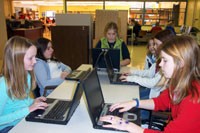In the spring of 2004, the Department of Education and Early Childhood Development implemented an action-based research project to evaluate the impact of providing dedicated notebook computer access to students and teachers to support learning and teaching practices. The two year Dedicated Notebook Research Project involved three Francophone and three Anglophone schools who were selected by a Department of Education and Early Childhood Development Selection Committee comprised of education stakeholders.
The selection committee investigated five areas of consideration:
- School Improvement Plan (including Vision Statement and Technology Plan)
- School and Project Leadership
- Professional Development/Learning Opportunities
- Demonstrated Efforts in Partnership, Networking, Communication and Promotion
- Experiences, Innovations and Achievements



